JUSTICE JOURNEY
Since 2019, diverse groups of CPJI members, local residents and community leaders have taken annual educational trips into the heart of civil rights history—Birmingham, Montgomery, Tuskegee and Selma, Ala.
Described as life-changing by many participants, the two-day trip features conversations with movement leaders, a walk across the Edmund Pettus Bridge and a solemn visit to the National Memorial for Peace and Justice, where the names of several Maury County lynching victims are etched in stone.













ARE YOU INTERESTED IN ATTENDING THE JUSTICE JOURNEY?
The next Justice Journey will be in June 17-18, 2026. The cost is $350/per person. If you are interested in attending, fill out the form to join the list. If you have any questions, please email information@cpji.org
Payment can be made in two installments
Space is limited and seats are not reserved until you receive a confirmation email from CPJI.
STOPS ALONG THE JUSTICE JOURNEY
16th Street Baptist Church
Organized in 1873, 16th Street Baptist Church was the first black church in Birmingham. On Sunday, September 15, 1963, at 10:22 a.m., the church became known around the world when a bomb exploded, killing four young girls attending Sunday School and injuring more than 20 other members of the congregation.
Birmingham Civil Rights Institute
The Birmingham Civil Rights Institute (BCRI) — part of the Birmingham Civil Rights National Monument and an affiliate of the Smithsonian Institution — is a cultural and educational research center that promotes a comprehensive understanding of the significance of civil rights developments in Birmingham. Exhibits include a replica of a Freedom Riders bus and the jail cell door from behind which Dr. Martin Luther King, Jr., penned his famous “Letter From Birmingham Jail.” The institute is also home to an expansive archive of documents from the Civil Rights Movement and nearly 500 recorded oral histories relevant to the period.
Brown Chapel AME Church
Brown Chapel African Methodist Episcopal (AME) Church, the first AME church in Alabama, acted as a hub for the civil rights movement, particularly during Bloody Sunday. It was here that activists gathered to prepare for the march to Montgomery. As the day unfolded in violence, the church served as a sanctuary for the injured and a symbol of resilience. Today, Brown Chapel AME Church continues to be a vibrant spiritual and cultural center, preserving its historic legacy while actively engaging in the ongoing pursuit of civil rights and social progress.
Dexter Avenue King Memorial Baptist Church
The Dexter Avenue King Memorial Baptist Church is a national historic landmark that was founded in 1877 in a slave trader’s pen in Montgomery. Much of Montgomery’s early civil rights activity — most famously the 1956 Bus Boycott — was directed by Dr. King from his office in the church.
National Memorial for Peace and Justice
The National Memorial for Peace and Justice, located in Montgomery, is a profoundly impactful monument dedicated to the victims of racial violence and lynching in the United States. Opened in 2018, it stands as a solemn reminder of the country's troubled history of racial injustice and a powerful call to acknowledge and confront this painful legacy.
Edmund Pettus Bridge
The Edmund Pettus Bridge is a National Historic Landmark located in Selma. It played a pivotal role in the civil rights movement when, on March 7, 1965, peaceful civil rights activists were brutally attacked by law enforcement while attempting to march from Selma to Montgomery to protest the denial of voting rights to African Americans, as well as the murder of 26-year-old activist Jimmie Lee Jackson, who had been fatally shot by police during a peaceful protest just days before.
This infamous event, known as Bloody Sunday, galvanized the nation's support of civil rights. Today, the Edmund Pettus Bridge stands as a powerful symbol of resilience, unity, and the ongoing fight for justice and equality in the United States.
Tuskegee History Center
Established in 1997, the Tuskegee History Center was formed originally to serve as a permanent memorial to the victims and survivors of the Tuskegee Syphilis Study.







